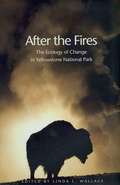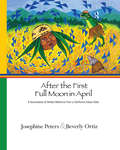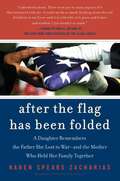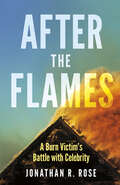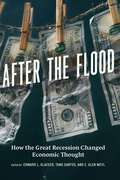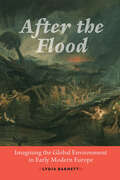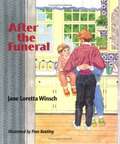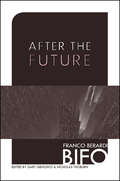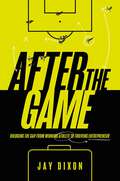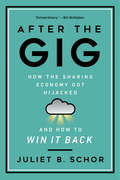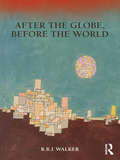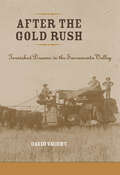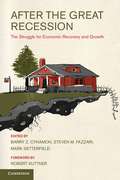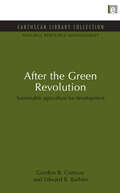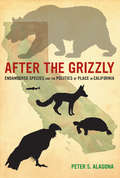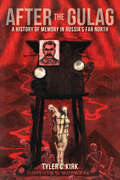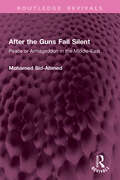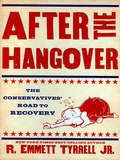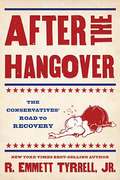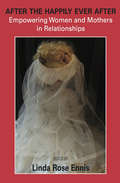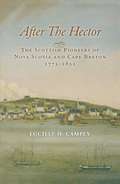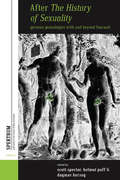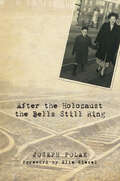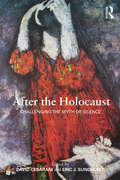- Table View
- List View
After the Fires: The Ecology of Change in Yellowstone National Park
by Linda L. WallacePlant and fire ecologist Wallace (U. of Oklahoma) provides a comprehensive scientific summary of the effects of the dramatic fires that tore across Wyoming and Montana in 1988. Even before the ashes had cooled, scientists from many disciplines began research, asking critical questions about the extent and intensity of the fires and initiating studies to determine the effects on geology, hydrology, plant and animal ecology, aquatic ecosystems, and landscape and ecosystem structure and function. The collection shows that the largest effects were found to have been felt at the smallest scales, and that the long-term devastation that had been predicted did not come to pass. Annotation ©2004 Book News, Inc. , Portland, OR (booknews. com)
After the First Full Moon in April: A Sourcebook of Herbal Medicine from a California Indian Elder
by Josephine Grant Peters Beverly OrtizIn this extraordinary book Josephine Peters, a respected northern California Indian elder and Native healer, shares her vast, lifelong cultural and plant knowledge. The book begins with Josephine's personal and tribal history and gathering ethics. Josephine then instructs the reader in medicinal and plant food preparations and offers an illustrated catalog of the uses and doses of over 160 plants. At a time of the commercialization of traditional ecological knowledge, Peters presents her rich tradition on her own terms, and according to her spiritual convictions about how her knowledge should be shared. This volume is essential for anyone working in ethnobotany, ethnomedicine, environmental anthropology, Native American studies, and Western and California culture and history.
After the Flag Has Been Folded: A Daughter Remembers the Father She Lost to War--and the Mother Who Held Her Family Together
by Karen Spears ZachariasKaren Spears was nine years old, living with her family in a trailer in rural Tennessee, when her father, David Spears, was killed in the Ia Drang Valley in Vietnam. It was 1966 -- in a nation being torn apart by a war nobody wanted, in an emotionally charged Southern landscape stained with racism and bigotry -- and suddenly the care and well-being of three small children were solely in the hands of a frightened young widow with no skills and a ninth-grade education. But thanks to a mother's remarkable courage, strength, and stubborn tenacity, a family in the midst of chaos and in severe crisis miraculously pulled together to achieve its own version of the American Dream.Beginning on the day Karen learns of her father's death and ending thirty years later with her pilgrimage to the battlefield where he died, half a world away from the family's hometown, After the Flag Has Been Folded is a triumphant tale of reconciliation between a daughter and her father, a daughter and her nation -- and a poignant remembrance of a mother's love and heroism.
After the Flames: A Burn Victim's Battle With Celebrity
by Jonathan R. Rose“A fast-paced, compelling narrative that goes far beyond the headlines.” — KEVIN DONOVAN, author of The Billionaire MurdersFor Joey Philion, surviving the fire was only the beginning.On the morning of March 10th, 1988, in Orillia, Ontario, a house fire engulfed fourteen-year-old Joey Philion in flames. He suffered third degree burns on 95 percent of his body. Doctors didn’t think he would make it through the night.After the Flames is about one of the world's most famous burn victims: his incredible survival, his nightmarish path to recovery that helped revolutionize medical treatment for burn victims worldwide, the fame thrust upon him after he was declared a hero from the media, and the tumultuous years that followed, most of which were spent under the microscope of an unforgiving public eye.The story also follows Joey’s family, including his mother Linda, stepfather Mike, and younger brother Danny, all of whom endured their own tremendous hardships in the wake of a fire that changed their lives forever.
After the Flood: How the Great Recession Changed Economic Thought
by Edward L. Glaeser E. Glen Weyl Tano SantosThe past three decades have been characterized by vast change and crises in global financial markets—and not in politically unstable countries but in the heart of the developed world, from the Great Recession in the United States to the banking crises in Japan and the Eurozone. As we try to make sense of what caused these crises and how we might reduce risk factors and prevent recurrence, the fields of finance and economics have also seen vast change, as scholars and researchers have advanced their thinking to better respond to the recent crises. A momentous collection of the best recent scholarship, After the Flood illustrates both the scope of the crises’ impact on our understanding of global financial markets and the innovative processes whereby scholars have adapted their research to gain a greater understanding of them. Among the contributors are José Scheinkman and Lars Peter Hansen, who bring up to date decades of collaborative research on the mechanisms that tie financial markets to the broader economy; Patrick Bolton, who argues that limiting bankers’ pay may be more effective than limiting the activities they can undertake; Edward Glaeser and Bruce Sacerdote, who study the social dynamics of markets; and E. Glen Weyl, who argues that economists are influenced by the incentives their consulting opportunities create.
After the Flood: Imagining the Global Environment in Early Modern Europe
by Lydia BarnettHow the story of Noah's Flood was central to the development of a global environmental consciousness in early modern Europe.Winner of the Morris D. Forkosch Prize by the Journal of the History of Ideas, Short-listed for the Kenshur Prize by the Center for Eighteenth-Century Studies, Indiana UniversityMany centuries before the emergence of the scientific consensus on climate change, people began to imagine the existence of a global environment: a natural system capable of changing humans and of being changed by them. In After the Flood, Lydia Barnett traces the history of this idea back to the early modern period, when the Scientific Revolution, the Reformations, the Little Ice Age, and the overseas expansion of European empire, religion, and commerce gave rise to new ideas about nature and humanity, and their intersecting histories. Recovering a forgotten episode in the history of environmental thought, Barnett brings to light the crucial role of religious faith and conflict in fostering new ways of thinking about the capacity of humans and nature to change each other on a planetary scale. In the hands of Protestant and Catholic writers from across Europe and its American colonies, the biblical story of Noah's Flood became a vehicle for imagining the power of sin to wreck the world, the dangers of overpopulation, the transformative effects of shifting landforms on the course of human history, and the impact of a changing climate on human bodies, health, and lives. Following Noah's Flood as a popular topic of debate through long-distance networks of knowledge from the late sixteenth through the early eighteenth centuries, Barnett reveals how early modern earth and environmental sciences were shaped by gender, evangelism, empire, race, and nation. After the Flood illuminates the hidden role and complicated legacy of religion in the emergence of a global environmental consciousness.
After the Funeral
by Jane Loretta WinschThe strange and disturbing new feelings that grief brings are frightening and stressful for children. And although most parents might feel prepared to deal with the anger, sadness, and loneliness that accompany the loss of a loved one, they might not feel quite as prepared to deal with children's other less obvious, yet equally predominant, feelings of embarrassment, fear, and inadequacy. AFTER THE FUNERAL offers some very real help to parents, teachers, and other caring adults in dealing with the complex reactions that children have to a loss. Its simple format encourages honest dialogue and compassionately helps children to recognize some of the raw feelings of grief--and then confront it honestly. After the Funeral is a positive contribution that will help children and their families move forward towards acceptance, understanding, and hope.
After the Future
by Franco Bifo Berardi Ph.D. Nicholas Thoburn Gary GenoskoAfter the Future explores a century-long obsession with the concept of the "future," starting with Marinetti's "Futurist Manifesto," tracing it through the punk movement of the early 70s, and into the media revolution of the 90s. The future, Bifo argues, has come and gone, the concept has lost its usefulness. Now it's our responsibility to decide what comes next.
After the Game: Bridging the Gap from Winning Athlete to Thriving Entrepreneur
by Jay DixonWhat if you could harness the many invaluable lessons you learned as a college or professional athlete and apply them to your professional and personal life? In After the Game, former D1 college football player turned successful business leader Jay Dixon shows you how.Crafted in the tradition of wisdom-rich business fables, After the Game combines a page-turning fictional narrative with a wealth of real-life lessons and insights designed to inform, advise, and inspire budding entrepreneurs and future CEOs. You&’ll discover: research that proves athletes are perfectly suited to own and lead businesses ten mindset elements that are crucial to your success at work and in life seven hands-on lessons that will accelerate your journey from idea to ownership a proven playbook to become a CEO eleven years faster than typical routes how self-awareness and emotional intelligence are vital on your path to CEO how to build a successful independent enterprise and achieve substantial personal growth . . . and much more. With billions of dollars&’ worth of small businesses set to be sold or passed down as baby boomers move into their retirement years, opportunities abound for savvy entrepreneurs to learn to acquire, lead, and sell those businesses—and no demographic is more poised and prepared to do so than former athletes. This is your time. Don&’t stand on the sidelines another minute. Get up, get ready, and get back in the action. A glorious new future awaits.
After the Gig: How the Sharing Economy Got Hijacked and How to Win It Back
by Juliet SchorHow to make the sharing economy work for everyone When the "sharing economy" launched a decade ago, proponents claimed that it would transform the experience of work—giving earners flexibility, autonomy, and a decent income. It was touted as a cure for social isolation and rampant ecological degradation. But this novel form of work soon sprouted a dark side: exploited Uber drivers, neighborhoods ruined by Airbnb, racial discrimination, and rising carbon emissions. Several of the most prominent platforms are now faced with existential crises as they prioritize growth over fairness and long-term viability. Nevertheless, the basic model—a peer-to-peer structure augmented by digital tech—holds the potential to meet its original promises. Based on nearly a decade of pioneering research, After the Gig dives into what went wrong with this contemporary reimagining of labor. The book examines multiple types of data from thirteen cases to identify the unique features and potential of sharing platforms that prior research has failed to pinpoint. Juliet B. Schor presents a compelling argument that we can engineer a reboot: through regulatory reforms and cooperative platforms owned and controlled by users, an equitable and truly shared economy is still possible.
After the Globe, Before the World
by RBJ WalkerThis book explores the implications of claims that the most challenging political problems of our time express an urgent need to reimagine where and therefore what we take politics to be. It does so by examining the relationship between modern forms of politics (centred simultaneously within individual subjects, sovereign states and an international system of states) and the (natural, God-given or premodern) world that has been excluded in order to construct modern forms of political subjectivity and sovereign authority. It argues that the ever-present possibility of a world outside the international both sustains the structuring of relations between inclusion and exclusion within the modern internationalized political order and generates desires for escape from this order to a politics encompassing a singular humanity, cosmopolis, globe or planet that are doomed to disappointment. On this basis, the book develops a critique of prevailing traditions of both political theory and theories of international relations. It especially examines what it might now mean to think about sovereignties, subjectivities, boundaries, borders and limits without automatically reproducing forms of inclusion and exclusion, or universality and particularity, expressed in the converging but ultimately contradictory relationship between international relations and world politics.
After the Gold Rush: Tarnished Dreams in the Sacramento Valley
by David Vaught2008 Winner of the Albert J. Beveridge Award of the American Historical Association"It is a glorious country," exclaimed Stephen J. Field, the future U.S. Supreme Court justice, upon arriving in California in 1849. Field's pronouncement was more than just an expression of exuberance. For an electrifying moment, he and another 100,000 hopeful gold miners found themselves face-to-face with something commensurate to their capacity to dream. Most failed to hit pay dirt in gold. Thereafter, one illustrative group of them struggled to make a living in wheat, livestock, and fruit along Putah Creek in the lower Sacramento Valley. Like Field, they never forgot that first "glorious" moment in California when anything seemed possible. In After the Gold Rush, David Vaught examines the hard-luck miners-turned-farmers—the Pierces, Greenes, Montgomerys, Careys, and others—who refused to admit a second failure, faced flood and drought, endured monumental disputes and confusion over land policy, and struggled to come to grips with the vagaries of local, national, and world markets.Their dramatic story exposes the underside of the American dream and the haunting consequences of trying to strike it rich.
After the Gold Rush: Tarnished Dreams in the Sacramento Valley (Revisiting Rural America)
by David VaughtA dramatic history of a group of families in post-gold rush California who turned to agriculture when mining failed. &“It is a glorious country,&” exclaimed Stephen J. Field, the future U.S. Supreme Court justice, upon arriving in California in 1849. Field&’s pronouncement was more than just an expression of exuberance. For an electrifying moment, he and another 100,000 hopeful gold miners found themselves face-to-face with something commensurate to their capacity to dream. Most failed to hit pay dirt in gold. Thereafter, one illustrative group of them struggled to make a living in wheat, livestock, and fruit along Putah Creek in the lower Sacramento Valley. Like Field, they never forgot that first &“glorious&” moment in California when anything seemed possible. In After the Gold Rush, David Vaught examines the hard-luck miners-turned-farmers—the Pierces, Greenes, Montgomerys, Careys, and others—who refused to admit a second failure, faced flood and drought, endured monumental disputes and confusion over land policy, and struggled to come to grips with the vagaries of local, national, and world markets. Their dramatic story exposes the underside of the American dream and the haunting consequences of trying to strike it rich.&“An excellent history of farming in the Sacramento Valley in the late nineteenth century.&” —California History&“Vaught tells a riveting story of two generations of farmers who &“committed themselves not only to the market but to community life as well.&” He argues that these twin commitments, born of their failures in the gold fields, were an essential part of the culture of American capitalism that emerged in the second half of the nineteenth century.&” —Business History Review&“Vaught set himself the goal of writing a &“new&” rural history of California, examining the state&’s wheat farmers in their social and cultural contexts. In After the Gold Rush, he achieves his goal admirably.&” —Journal of American History&“An agricultural history that weaves together an unpredictable creek, a fluctuating market, and the perseverance of the American Dream.&” —Journal of Interdisciplinary History2008 Winner of the Albert J. Beveridge Award of the American Historical Association
After the Great Recession
by Barry Z. Cynamon Steven M. Fazzari Mark SetterfieldThe severity of the Great Recession and the subsequent stagnation caught many economists by surprise. But a group of Keynesian scholars warned for some years that strong forces were leading the US toward a deep, persistent downturn. This book collects essays about these events from prominent macroeconomists who developed a perspective that predicted the broad outline and many specific aspects of the crisis. From this point of view, the recovery of employment and revival of strong growth requires more than short-term monetary easing and temporary fiscal stimulus. Economists and policy makers need to explore how the process of demand formation failed after 2007 and where demand will come from going forward. Successive chapters address the sources and dynamics of demand, the distribution and growth of wages, the structure of finance and challenges from globalization, and inform recommendations for monetary and fiscal policies to achieve a more efficient and equitable society.
After the Green Revolution: Sustainable Agriculture for Development (Natural Resource Management Set)
by Edward B. Barbier Gordon R. Conway'The Green Revolution' of the 60's and 70's produced immense gains in food cereal production in the Third World. But there are huge problems in the 'post-revolutionary' era: farmers with small or marginal holdings have benefited less than wealthier farmers; intensive mono-cropping has made production more susceptible to environmental stresses and shocks. Now there is evidence of diminishing returns from intensive and intensively chemical agricultural production. What is needed is a new approach, equally revolutionary, but different in its ideas and style. The authors set out what they mean by 'sustainable' agriculture in the new era and look at the effects of international economic restraints and of national policies on the kind of development they see as necessary. They chart a path for sustainable livelihoods for Third World farmers enmeshed by forces outside their control. They describe methods of evaluating and resolving the tough trade-offs all levels of intervention, from international trade down to the individual farm. This book cannot provide all the answers, but it does indicate what international conditions we need to be aware of, what national policies we need to advocate and what approaches at the local level we need to adopt to ensure the goal of agricultural sustainability. Originally published in 1990
After the Grizzly: Endangered Species and the Politics of Place in California
by Peter S. AlagonaThoroughly researched and finely crafted, After the Grizzly traces the history of endangered species and habitat in California, from the time of the Gold Rush to the present. Peter S. Alagona shows how scientists and conservationists came to view the fates of endangered species as inextricable from ecological conditions and human activities in the places where those species lived. Focusing on the stories of four high-profile endangered species--the California condor, desert tortoise, Delta smelt, and San Joaquin kit fox--Alagona offers an absorbing account of how Americans developed a political system capable of producing and sustaining debates in which imperiled species serve as proxies for broader conflicts about the politics of place. The challenge for conservationists in the twenty-first century, this book claims, will be to redefine habitat conservation beyond protected wildlands to build more diverse and sustainable landscapes.
After the Gulag: A History of Memory in Russia's Far North
by Tyler C. KirkFrom 1929 to 1958, hundreds of thousands of prisoners and exiles from across the Soviet Union were sent to the harsh yet resource-rich Komi Republic in Russia's Far North. When the Soviet Union collapsed, former prisoners sent their autobiographies to Komi's local branches of the anti-Stalinist Memorial Society and history museums.Using these previously unavailable personal records, alongside newspapers, photographs, interviews, and other non-state archival sources, After the Gulag sheds new light not only on how former prisoners experienced life after release but also how they laid the foundations for the future commemoration of Komi's dark past. Bound by a "camp brotherhood," they used informal social networks to provide mutual support amid state and societal oppression. Decades later, they sought rehabilitation with the help of the newly formed Memorial Society—the civic organization largely responsible for the de-Stalinization of the Soviet Union. In sharing their life stories and family archives with Memorial, they sustained an alternate history of the Soviet Union.Offering an unprecedented look at the legacies of mass repression under Stalin, After the Gulag explores how ordinary political prisoners from across the Soviet Union navigated life after release, using memoirs, letters, and art to translate their experiences and shape the politics of memory in post-Soviet Russia.
After the Guns Fall Silent: Peace or Armageddon in the Middle-East (Routledge Revivals)
by Mohamed Sid-AhmedFirst published in 1976, After the Guns Fall Silent is an important Arab statement on the Middle East crisis. The central theme is that the October war and détente fundamentally changed the basis of the conflict. The Arab military success and the impact of the oil weapon established a parity between Arab quantity and Israel quality. This new sense of equality has forced both sides into contemplating dialogue rather than unyielding confrontation. The author also predicts that the Palestinian issue is expected to become even more explosive as their advance in diplomatic stature has not produced any political or territorial gain and their struggle has become a world inspiration for the revolt of the dispossessed against the affluent. This book will be of interest to students of history, political science, international relations and Middle Eastern studies.
After the Hangover
by Emmett TyrrellLooking for real hope and change?The man Hardball host Chris Matthews calls "the legendary R. Emmett Tyrrell Jr." has done it again. Tyrrell, author of such tours de force as New York Times bestseller Boy Clinton: The Political Biography, The Liberal Crack-Up, and The Conservative Crack-Up, serves up an insightful and delightful exploration of the past, present, and future of American conservatism, or what he terms, "America's longest dying political philosophy." And its future is bright.Tyrrell begins with a sparkling distillation of conservative theory and history, complete with personal anecdotes from his decades in the movement, inspired by its luminaries, bored by its dim bulbs. He explains the nature of the conservative temperament--its "political libido"--and how it plays out in today's curious political culture; examines the vital role of a true "political culture" and solidarity in opposing the left and then offers a comprehensive agenda for the future of the movement that every political player on both the right and the left will have to read to grapple with in 2010 and 2012.Tyrrell also considers American Liberalism--its excesses, quirks, and near suicidal instinct. Far from offering mere indictment, however, Tyrrell also delivers a unique perspective on Liberalism's strengths, such as its intramural ecumenism and rare ability to rally around shared causes, explaining how conservatives could learn and profit from the example.It goes without saying that through it all Tyrrell's famous humor crackles and lifts the spirit. Conservatives looking for perspective on the current scene, a richer understanding of their shared past, and hope for the future will find After the Hangover as refreshing as it is restorative. PREVIOUS ACCLAIM"The legendary R. Emmett Tyrrell Jr." ?CHRIS MATTHEWS"No columnist, no author, has had a greater influence upon the course of American political history over the past decade than that ribald contrarian, R. Emmett Tyrrell Jr. Even the slain giants die laughing." ?TOM WOLFE"Washington would not be the same without Bob Tyrrell and neither would the American conservative movement. While dilettantes come and go, the relentless and irrepressible Tyrrell is forever." ?DAILY TELEGRAPH (LONDON)"Tyrrell is the master of a particular form--taking broken shards of silliness, deviance, hypocrisy, crime, and treason, shaping them into Erasmian examples of human folly, and doing so with style and flow." ?ARAM BAKSHIAN"Tyrrell alerts us to the dangers our political system faces . . . and he does it with the insight, wit, and style that mark him as a great American writer." ?BOB BARR"R. Emmett Tyrrell Jr. has written a stimulating book which should cause many Americans to rethink positions they have taken in the debates of the past decade." ?HENRY KISSINGER"For a man I disagree with as much as Emmett Tyrrell . . . I must say that I enjoyed the sheer hell out of his book." ?NORMAN MAILER
After the Hangover: The Embarrassing Fall and Coming Ascendancy of American Conservatism
by R. Emmett TyrrellAn insider's investigation of the state of the post-Bush Conservative movement in the United States today. R. Emmett Tyrrell, Jr. -intimately familiar with the ideology and personalities of the conservative movement in the United States from the inside-analyzes who was right and what went wrong. And, in the process, he outlines the conservative agenda for the "next ascendancy. "Tyrrell's well-turned prose has received acclaim from such people as P. J. O'Rourke, Norman Mailer, Paul Johnson, Dick Morris, William Safire, William F. Buckley Jr. , and Henry Kissinger. Tom Wolfe has said, "No columnist, no author, has had a greater influence upon the course of American political history over the past decade than the ribald contrarian R. Emmett Tyrrell Jr. Even the slain giants die laughing. "
After the Happily Ever After: Empowering Women And Mothers In Relationships
by Linda Rose EnnisThis book is about the two-tiered system and invisible imbalance that operates within the framework of the family. It is about the fantasy of the "happily-ever- after," which the wedding industry promotes and Western society reinforces. Why are we hanging onto this faux happiness at the expense of our future well-being? Why don't we wonder what happened after "they lived happily ever after" and if, in fact, they really do? What I hope to achieve by writing this book is to rattle the cage of young brides, about to embark on this journey, to talk about these issues with their future partners and to set the system up in a more equal way, so no one is caught off guard if and when things crumble. It will be difficult to achieve this task because no one wants to think about things falling apart before the marriage even begins, and most certainly it sours the sweetness of the fantasy of the "happily ever after," as we know it. What we don't realize is that there will be less bitterness and upset for the family, especially for the children, if we pursue this line of thinking. Isn't that the real "happily-ever-after?"
After the Hector: The Scottish Pioneers of Nova Scotia and Cape Breton, 1773-1852
by Lucille H. CampeyThis is the first fully documented and detailed account, produced in recent times, of one of the greatest early migrations of Scots to North America. The arrival of the Hector in 1773, with nearly 200 Scottish passengers, sparked a huge influx of Scots to Nova Scotia and Cape Breton. Thousands of Scots, mainly from the Highlands and Islands, streamed into the province during the late 1700s and the first half of the nineteenth century. Lucille Campey traces the process of emigration and explains why Scots chose their different settlement locations in Nova Scotia and Cape Breton. Much detailed information has been distilled to provide new insights on how, why and when the province came to acquire its distinctive Scottish communities. Challenging the widely held assumption that this was primarily a flight from poverty, After the Hector reveals how Scots were being influenced by positive factors, such as the opportunity for greater freedoms and better livelihoods. The suffering and turmoil of the later Highland Clearances have cast a long shadow over earlier events, creating a false impression that all emigration had been forced on people. Hard facts show that most emigration was voluntary, self-financed and pursued by people expecting to improve their economic prospects. A combination of push and pull factors brought Scots to Nova Scotia, laying down a rich and deep seam of Scottish culture that continues to flourish. Extensively documented with all known passenger lists and details of over three hundred ship crossings, this book tells their story. "The saga of the Scots who found a home away from home in Nova Scotia, told in a straightforward, unembellished, no-nonsense style with some surprises along the way. This book contains much of vital interest to historians and genealogists." - Professor Edward J. Cowan, University of Glasgow "…a well-written, crisp narrative that provides a useful outline of the known Scottish settlements up to the middle of the 19th century…avoid[s] the sentimental ’victim & scapegoat approach’ to the topic and instead has provided an account of the attractions and mechanisms of settlement…." - Professor Michael Vance, St. Mary’s University, Halifax
After the History Of Sexuality
by Dagmar Herzog Helmut Puff Scott SpectorMichel Foucault's seminal The History of Sexuality (1976-1984) has since its publication provided a context for the emergence of critical historical studies of sexuality. This collection reassesses the state of the historiography on sexuality--a field in which the German case has been traditionally central. In many diverse ways, the Foucauldian intervention has governed the formation of questions in the field as well as the assumptions about how some of these questions should be answered. It can be argued, however, that some of these revolutionary insights have ossified into dogmas or truisms within the field. Yet, as these contributions meticulously reveal, those very truisms, when revisited with a fresh eye, can lead to new, unexpected insights into the history of sexuality, necessitating a return to and reinterpretation of Foucault's richly complex work. This volume will be necessary reading for students of historical sexuality as well as for those readers in German history and German studies generally who have an interest in the history of sexuality.
After the Holocaust the Bells Still Ring
by Joseph PolakWinner of:2015 National Jewish Book Award; Biography, Autobiography, and MemoirThis memoir is a fascinating portrait of mother and child who miraculously survive two concentration camps, then, after the war, battle demons of the past, societal rejection, disbelief, and invalidation as they struggle to reenter the world of the living. It is the tale of how one newly takes on the world, having lived in the midst of corpses strewn about in the scores of thousands, and how one can possibly resume life in the aftermath of such experiences. It is the story of the child who decides, upon growing up, that the only career that makes sense for him in light of these years of horror is to become someone sensitive to the deepest flaws of humanity, a teacher of God's role in history amidst the traditions that attempt to understand it—and to become a rabbi. Readers will not emerge unscathed from this searing work, written by a distinguished, Boston-based rabbi and academic.
After the Holocaust: Challenging the Myth of Silence
by Eric J. Sundquist David CesaraniFor the last decade scholars have been questioning the idea that the Holocaust was not talked about in any way until well into the 1970s. After the Holocaust: Challenging the Myth of Silence is the first collection of authoritative, original scholarship to expose a serious misreading of the past on which, controversially, the claims for a ‘Holocaust industry’ rest. Taking an international approach this bold new book exposes the myth and opens the way for a sweeping reassessment of Jewish life in the postwar era, a life lived in the pervasive, shared awareness that Jews had narrowly survived a catastrophe that had engulfed humanity as a whole but claimed two-thirds of their number. The chapters include: an overview of the efforts by survivor historians and memoir writers to inform the world of the catastrophe that had befallen the Jews of Europe an evaluation of the work of survivor-historians and memoir writers new light on the Jewish historical commissions and the Jewish documentation centres studies of David Boder, a Russian born psychologist who recorded searing interviews with survivors, and the work of philosophers, social thinkers and theologians theatrical productions by survivors and the first films on the theme made in Hollywood how the Holocaust had an impact on the everyday life of Jews in the USA and a discussion of the different types, and meanings, of ‘silence’. A breakthrough volume in the debate about the ‘Myth of Silence’, this is a must for all students of Holocaust and genocide.
